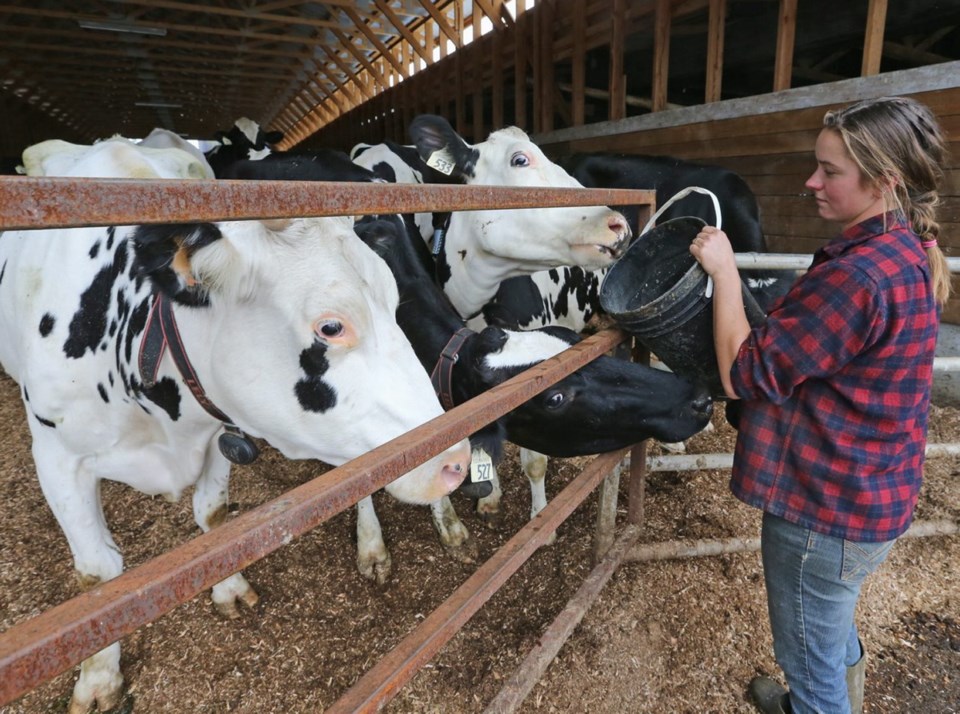Vancouver Island dairy farmers are dismayed that Canada is giving up a chunk of its dairy-market share to American competitors.
“It’s disappointing for sure, because the Canadian government was saying we wouldn’t lose any more of our market,” said Mickey Aylard, president of the Vancouver Island Milk Producers’ organization.
“Not only did they give up 3.59 per cent of the domestic dairy market, they have also eliminated some of our competitive dairy classes and have limited our export abilities.”
Island dairy farmers point out that the new U.S.-Mexico-Canada agreement, to replace NAFTA, is the latest trade agreement to chip away at Canada’s share of the market, following the Canada-EU deal and the Trans-Pacific Partnership.
It’s not only American dairy farmers who are getting more access to the Canadian market. U.S. drug companies can fend off generic competition for a few more years. Automakers are under pressure to build more cars where workers earn decent wages.
The agreement hammered out late Sunday between the United States and Canada, following an earlier U.S.-Mexico deal, replaces the 24-year-old North American Free Trade Agreement, which tore down trade barriers between the three countries.
Aylard, herd manager at the family’s fourth-generation Brackenhurst Farm in North Saanich, said Island dairy farmers are concerned to the point where they might hesitate to invest in the future. Brackenhurst is milking about 100 cows and has close to 220 animals on the farm.
Dairy farmers on the Island and throughout the province have banded together in the past decade to spend money on advertising and have seen their market grow, she said. Now she fears that growth will halt because of the latest deal.
Aylard said U.S. dairy farms are subsidized, making competition difficult.
The deal announcement preceded a Monday event at a Duncan farm featuring Henk Schuurmans, of Elmira, Ont., a dairy farmer who has been travelling across the country to urge that this country’s dairy sector remain Canadian. But disaster struck when Henk and his wife, Bettina, were in a collision with a transport truck in Saskatchewan in July. Bettina Schuurmans died and although her husband was injured, he was determined to finish the trip.
David Taylor, chairman of the board of the B.C. Dairy Association and B.C.’s representative with the Dairy Farmers of Canada, said when he heard the news, he was angry and disappointed.
“Once again, our industry has been compromised. The true value of our industry I don’t think has been taken into account and as a result, we are giving up additional access.”
The 3.59 per cent cut follows previous market share losses through the European deal and in the Trans-Pacific agreement.
“Now again, we get hit. So all of a sudden up to 10 per cent of our market is gone. It has been traded off and we are supposed to adjust to that.
“And that becomes just very, very difficult to do.”
Taylor, of the family-owned Viewfield Farms in Courtenay, said the farm milks 130 cows and supports local businesses.
Vancouver Island with its 40 dairy farms will “be milking less cows” and there will be fewer jobs in that sector as a result of the deal, he said.
Canada has vowed to provide compensation for dairy farmers but details are not yet known.
Chris Groenendijk, of the 300-acre Green Dike Farm in Westholme, near Crofton, where 150 cows are milked, said such agreements chip away at Canada’s dairy sector. “It always comes off of our profits whenever they chip away. The last dollar you make, so to speak, is where your profit comes from, never the first dollar.”
Every time there is a trade deal, “we’ve lost,” Groenendijk said. “I guess there’s a silver lining, saying the system is still intact, but I always feel it is compromised when you chip away at it more and more like that.”



